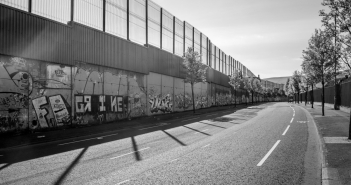Last week two young people were stabbed to death at London Bridge while attending a conference organized by the University of Cambridge on rehabilitation of prisoners through education. Boris Johnson and other Conservatives were quick to politicize the tragedy, implying the attack – by a convicted terrorist on day release – signified a failure of the very approaches its victims promoted. But, as one of the victims, Jack Merritt’s father, movingly wrote, his son would be ‘livid’ at the thought of his death being used to fuel an ‘agenda of hate.’[i]
Merritt’s death was not symptomatic of a failure of rehabilitation as an approach to crime and punishment, but of a government failure to fund it adequately. In fact, they provide for neither rehabilitative nor restorative forms of justice in such a way as to make either approach effective.
Jack Merritt and Saskia Jones’ deaths were a major international news story, but sadly stabbings of young people in London are all too common: from January to September 2019, there were over 67 homicides by stabbing (of over 110 homicides)[ii][1], and in 2018/19 there were almost 15,000 knife crimes in London overall.
In the U.K. as a whole,[iii] in the twelve months preceding March 2019, there were over 43,516 knife crimes recorded, representing an 80% rise over five years.[iv] Cuts to police funding, including the number of police officers, have contributed to this astounding rise in violent crime, and the ensuing deaths of young people – as have cuts to prison and probationary services.
Poverty, lack of access to healthcare (including mental health services), inadequate education and widespread inequalities relating to class and race, all contribute to proliferating violence in our society, whether terrorism, gang or domestic.
Traditionally Conservatives have been characterized as ‘strong’ on law and order, but ironically their policies often exacerbate the conditions that lead to crime. It is no exaggeration to say that austerity kills people in myriad ways. Besides knife crime, many deaths can be attributed to inadequate health care, homelessness, and even a sense of despair at the power wielded by an increasingly draconian welfare system.
Jeremy Corbyn’s Labour Party has been caricatured as crusty Marxists, out-of-touch fantasists, and even crazed Communists, by the neo-liberal radicals who have brought the U.K. to its knees. But all Labour is proposing, in its detailed and costed manifesto, is a level of public spending to bring the U.K. in line with European averages.
Labour simply proposes to reverse the austerity that has been to the benefit of several rich Tory donors, and the detriment of the rest of us, raising the overall standard of living to a point where business can flourish. It is not fantastical at all: it is common sense.
The Labour Party is seeking to cancel measures that literally punish people for being poor. For example, under new Universal Credit measures people are sanctioned simply for missing phone calls, with excuses rarely tolerated. They also want to raise the minimum wage, build more affordable accommodation and end homelessness.
Labour want to restore a standard of decency to the country. Is this really so radical? How have we arrived at a point where improving the lot of the homeless, of vulnerable children and wayward teenagers is characterized as ‘radical’?
Corbyn’s plans would simply bring the U.K. up to the European average of spending 45% of GDP on public services, in line with France, Italy, Austria, Finland, Sweden, Denmark and others.
And, in proposing to re-nationalise chaotically run and profiteering private railway companies, it aims to bring the highest commuting fares in Europe in line with the average.[v]
Moreover, by funding Fire Services appropriately, Labour seeks to do a lot more to prevent scandalous tragedies such as Grenfell. Again: why is this radical? When did our society begin to lose all perspective and with it decency?
The right-wing, mainstream press that stoke fear of a fictional ‘Communism,’ frame common sense solutions to society’s greatest ills as dangerous pipe-dreams. In so doing they pave the way for a further fragmentation of society – accelerating Margaret Thatcher idea of ‘no such thing as society,’ – and leading to Dickensian suffering.
At this point in the election cycle, with the fear-mongering rampant, we can only hope that what is clear on the ground – the obvious, unending effects of austerity and inequality – will sway people more than the lies and embellishments of those seeking to profit from social breakdown.
Dr Christiana Spens is the author of The Portrayal and Punishment of Terrorists in Western Media (Palgrave, 2019) and Shooting Hipsters: Rethinking Dissent in the Age of PR (Repeater Books, 2016). She earned her doctorate at the University of St. Andrews and is now based in Glasgow, where she writes for various publications including Studio International, Art Quarterly and Prospect.
[i] David Merritt, ‘’Jack would be livid his death has been used to further an agenda of hate’’, The Guardian, December 3rd, 2019, https://www.theguardian.com/uk-news/2019/dec/02/jack-merritt-london-bridge-attack-dave-merritt
[ii] Aidan Milan, ‘How many deadly stabbings have there been in London so far this year?’, Metro, September 25th, 2019, https://metro.co.uk/2019/09/25/many-deadly-stabbings-london-far-year-10804537/
[iii] Excluding Greater Manchester, due to recording issues.
[iv] Statista, ‘Number of knife crimes recorded in London from 2010/11 to 2018/19 (in 1,000s)’ https://www.statista.com/statistics/864736/knife-crime-in-london/
[v] Reality Check Team, ‘Are UK train fares the highest in Europe?’, BBC, August 14th, 2019, https://www.bbc.com/news/uk-49346642




